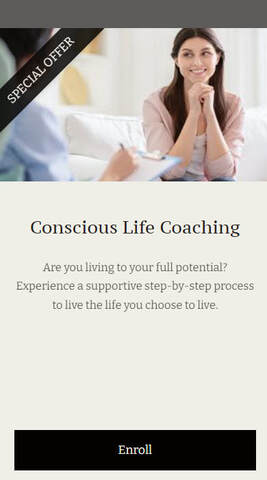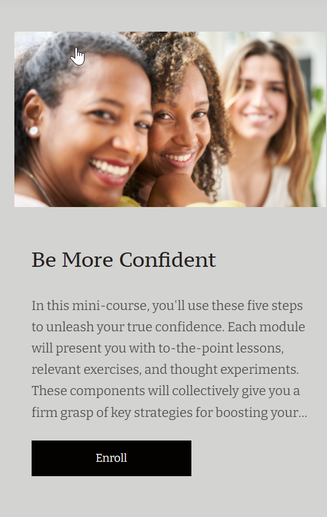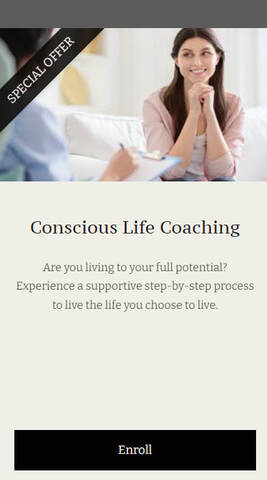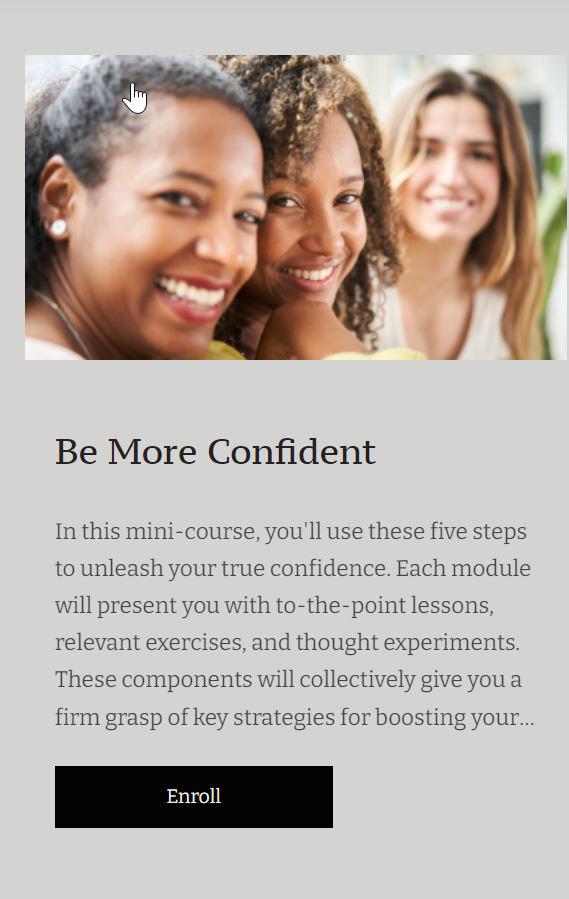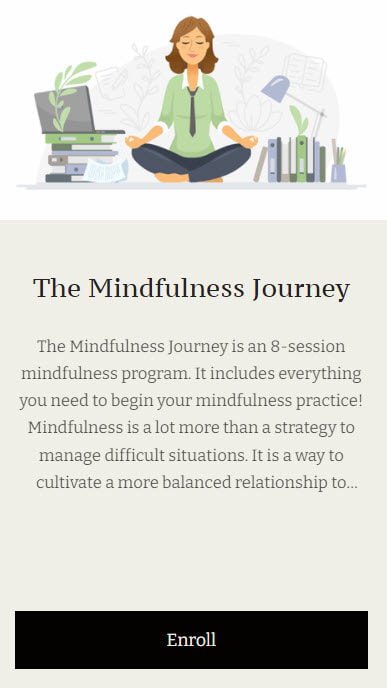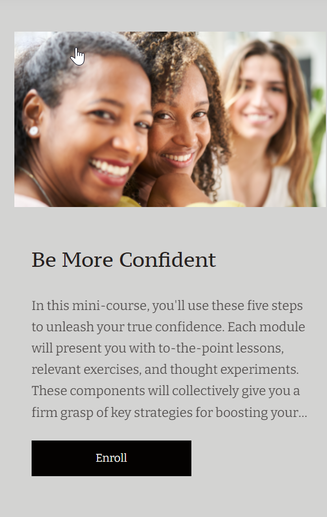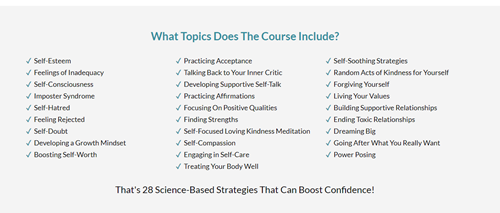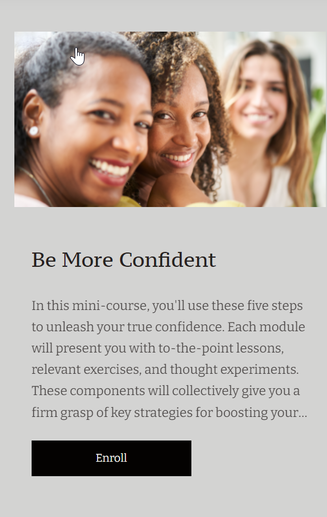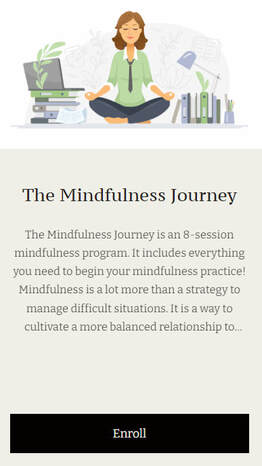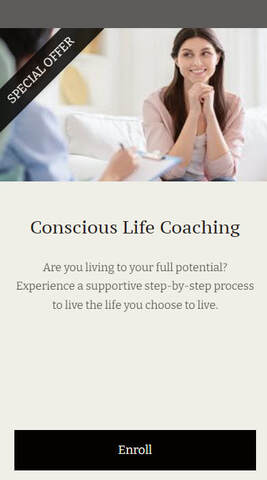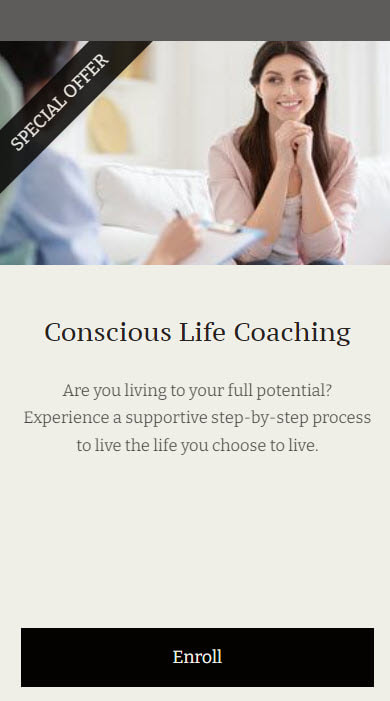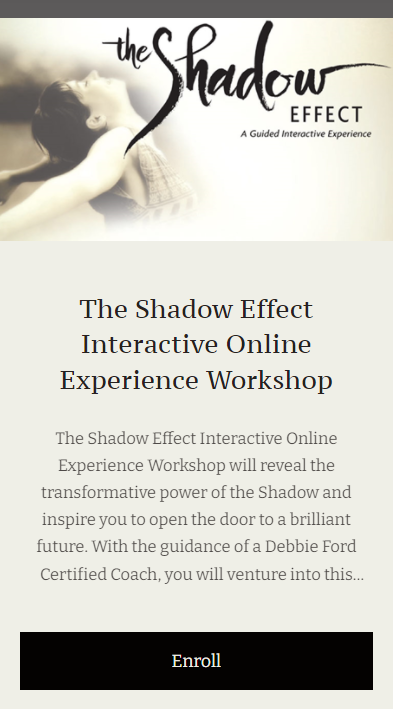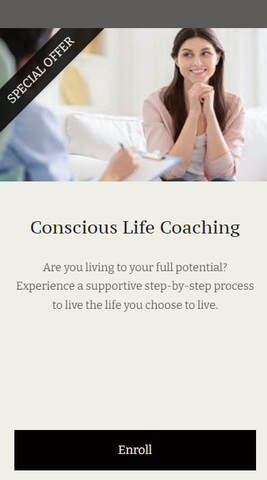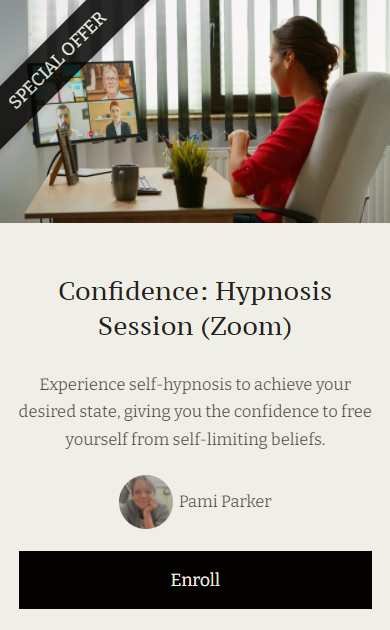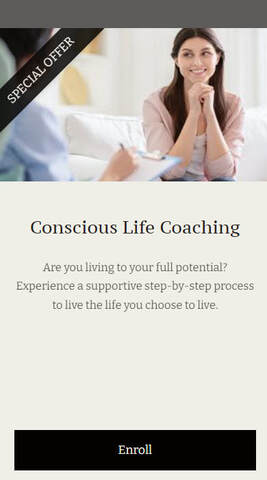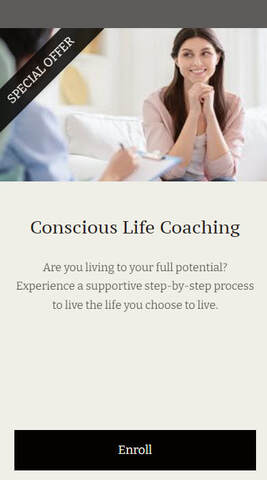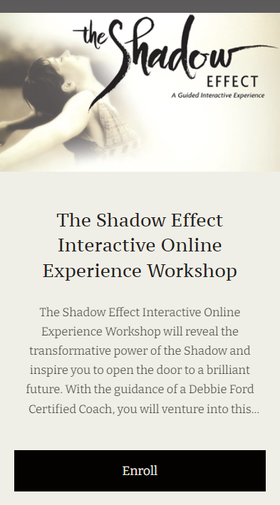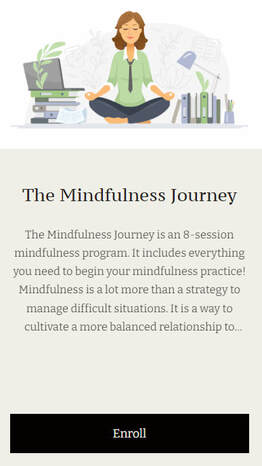|
Learn here about perspectives on self-affirmation and get examples of self-affirmations to try in your own life. Do you struggle to feel sure of yourself? Do people tell you that you lack confidence? Or does negative feedback rattle your sense of self or well-being? Then learning about self-affirmation may be helpful for you. Each of us faces numerous threats to our self-worth (insults, criticism, etc…). Yet, we are often able to look past these threats and still feel good about ourselves. Researchers propose that this is because we have a psychological protection system—a system that involves a variety of automatic, defensive mental strategies that protect our self-esteem from plummeting in the face of threats (Sherman & Cohen, 2006). For example, we tend to believe that we are responsible for positive outcomes but that we are not responsible for negative outcomes. We also diminish the importance of things we have failed at or things we're not very good at. And, we tend to be overly optimistic about our chances of success, our knowledge, and our competence (Sherman & Cohen, 2006). All of these "rationalizations" actually help us continue to feel good about ourselves, so they are generally good for our well-being. What is Self-Affirmation Theory?Self-affirmation theory is based on the idea that we are motivated to maintain our self-worth in the face of threats (Sherman & Cohen, 2006). When our self-esteem is threatened, we sometimes affirm other parts of ourselves unrelated to the threat (e.g., he may say I have a big nose, but I know I have a good personality). When we do this, it helps us realize that our self-worth is not contingent on whatever negative feedback we just got (Sherman & Cohen, 2006). According to psychologists, we can "self-affirm"—or protect our sense of self—by engaging in activities that remind us of who we are. These self-affirmations can involve family, friends, volunteer work, religion, art and music, or other activities that are central to how we see ourselves (Sherman & Cohen, 2006). How to Use Self-AffirmationsAffirmations can be defined as statements that we repeat to ourselves to help us shift the way we're thinking to be more positive. Often these affirmations are used to shift the way we're thinking about ourselves to be more positive. For example, if we've just been rejected by a potential romantic partner, we might say the affirmation, "I am worthy of love." Or, if we're struggling in our career, we might say the affirmation, "I am capable of success." These examples show how we try to maintain our self-esteem when it’s broken down. To try it, just choose a statement that represents how you want to think. Then, say it to yourself using these guidelines:
In SumFinding ways to maintain our self-worth is a worthwhile endeavor. Affirmations are just one way, but they are a fairly easy strategy to practice and use in daily life. References
Learn more about self-esteem and how you can achieve higher self-esteem in your life. Self-esteem represents the foundation that supports the relationship you have with yourself. It carries over into every aspect of life. If you’re reading this, you probably value this relationship and may want to build your self-esteem. By the end of this article, you should have a better understanding of self-esteem and ways to improve it. Let’s start with a simple definition. Most psychological theories agree that self-esteem refers to your evaluation of yourself (Mruk, 1995). Self-esteem can also be thought of as how much you like, approve of, or value yourself. Self-esteem can be applied to you globally (e.g., “On the whole, I am satisfied with myself”; Rosenberg et al., 1995) or to specific domains of your life (e.g., “I am good at my job and I’m proud of that”). Research shows that although self-esteem is relatively stable over one’s life, it is by no means fixed or unchangeable (Orth & Robins, 2014). What is Low Self-Esteem?Having low self-esteem corresponds to negative evaluations of yourself. Put differently, if you have low self-esteem, you generally don’t hold yourself in a positive light. You tend to be more critical of yourself. You might get stuck in loops of negative self-talk, telling yourself things like, “I’m worthless”, “I could never succeed at this”, or “I’m not smart enough”. This can bring up feelings of anxiety, sadness, or hopelessness. Self-esteem develops over your lifespan. It is thought that the beliefs you hold about yourself play a role in developing low self-esteem. The stronger the beliefs, the harder it may be to break the negative thought patterns that are associated with low self-esteem. Here are a few examples of beliefs that characterize low self-esteem.
What Causes Low Self-Esteem?Although there are a variety of factors that play a role in self-esteem, here are a few factors that may make it more likely for someone to develop low self-esteem:
How to Build Self-Esteem1. Live ConsciouslySelf-esteem is rooted in your ability to live consciously and focus on what is happening in the current moment, without ruminating on the past or overthinking the future. 2. Practice Self-AcceptanceThis involves accepting yourself unconditionally and showing yourself compassion across different situations (e.g., when you make a mistake).
What is self-consciousness, what causes it, and how do you overcome it? Do you find yourself thinking about how others see you? Do you often worry about offending or upsetting others? Do you get stressed out about having to perform in front of others? Then you might be self-conscious. According to those who study self-consciousness, it's human nature to focus on ourselves sometimes and to focus on others at other times. We might reflect on our thoughts, emotions, behaviors or the thoughts, emotions, and behaviors of others. The extent to which we focus or self-reflect on ourselves is thought to indicate our level of self-consciousness. Given this broad definition of self-consciousness, researchers suggest that there are two types of self-consciousness.
Self-Conscious EmotionsWhen we feel self-conscious, we might experience a variety of self-conscious emotions. They are:
Although self-conscious emotions are not always fun to experience, they help motivate our behavior in important ways. They can drive us to achieve more, to behave in ways that help us win friends, and to engage in more kind behaviors. Overall, they help us achieve important social goals (Tracy & Robins, 2004). How to Overcome Self-ConsciousnessSelf-consciousness generally develops when we are young. Although it can get easier in adulthood, it doesn't always. If we were worried about how others thought about us when we were young, we can sometimes bring these habits with us. That's why learning how to change these thought processes can be useful. So, here are some tips to overcome self-consciousness. 1. Build Self-Trust
2. Cultivate Mindfulness
In SumSelf-consciousness can be both a blessing and a curse. Hopefully, you learned some strategies here that helped you better understand self-consciousness and what to do about it. References
Have you ever felt like an imposter? Learn about what imposter syndrome is and read tips on overcoming it. What’s it’s like to feel like an imposter? It goes something like this: when you’ve accomplished a goal or achieved success, your inner voice tells you it was just luck or that you’re underqualified. You may doubt your skills and intelligence, even though you worked hard to get to where you are. If you’ve ever experienced something like this, you’ve likely experienced imposter syndrome. Early research on imposter syndrome showed that some people who have ample evidence of personal accomplishments are still convinced that they do not deserve the success they have (Clance & Imes, 1978). In other words, people’s subjective view of their success is incongruent with the objective reality of their accomplishments. So, the term imposter syndrome came to describe when people doubt their accomplishments and fear that they may be exposed as a fraud or “imposter”. We now know that almost 70% of people will experience imposter syndrome at some point during their lives (Sakulku, 2011). Oftentimes, people experiencing imposter syndrome will credit their success to luck, good timing, or connections, and they will dismiss their own hard work and skills in achieving success. Moreover, people with imposter syndrome find it difficult to accept positive feedback or praise from other people, which makes it even harder to break out of the belief that they are an imposter (LaDonna, Ginsburg, & Watling, 2018). What Causes Imposter Syndrome?There are a variety of factors that can contribute to the feeling of being an imposter. Here are a few: Major Transitions. Imposter syndrome is especially common among people who are starting something new, such as a new position after graduation (Rakestraw, 2017). These transitions are major life events that may cause people to doubt their abilities. Even those who rank higher in seniority may still doubt their achievements (LaDonna et al., 2018). Societal and Familial Pressures. The researchers who coined the term imposter syndrome found that it can develop among children who are harshly judged by their families as less intelligent than other family members (Clance & Imes, 1978). On the flip side, the researchers also found that imposter syndrome can develop among children with families who perceive their child as highly intelligent and competent. This may be because these children feel pressured to please their families and doubt themselves in situations where their skills are challenged. Stereotypes and Prejudice. All of us have different identities—whether we’re focusing on gender, age, race, or something else. Certain identities are criticized and belittled more than others, and this can lead to imposter syndrome among members of these groups. These stereotypes label individuals from certain groups as less intelligent and competent, which is a narrative that can be internalized as a belief among group members (Buczynski, Harrell, McGonigal, & Siegel, n.d.). Mental Illness. Imposter syndrome overlaps with characteristics of mental illnesses. For instance, imposter syndrome has been linked to feelings of self-doubt and can even lead to failure (Villwock, Sobin, Koester, & Harris, 2016). In fact, imposter syndrome commonly co-occurs with anxiety and depression. Further, people who are introverted and more anxious are more likely to experience imposter syndrome. Harsh criticism exacerbates feelings of imposter syndrome (Murugesu, 2020). Tips for Overcoming Imposter Syndrome1. Acknowledge your emotions:Try to accept your emotional experiences and remind yourself that feelings are not always an accurate representation of reality. If it helps, reflect on your feelings by writing them down and try to identify why you feel like an imposter. https://positivepsychology.com/understanding-emotions/ 2. Be realistic about your strengths and weaknesses:Although it’s cliché, it’s true that we are all good at something, but no one is good at everything. Understand your skills and reflect on your strengths and weaknesses. 3. Overcome perfectionism:You may have perfectionist habits that you need to slowly break. For example, try taking regular breaks, days off, and use relaxation techniques to calm down your anxiety. Remember that mistakes are a natural and inevitable part of life. In SumSometimes, there will be a little voice in your head that tries to downplay your accomplishments and tries to make you doubt yourself. Although that voice may get loud, remember this: You are capable, competent, and worthy. References
What is inadequacy and how do you work through it? Have you ever struggled to feel good about yourself? Do you wonder if you’re good enough? Do you question whether you're competent enough? Then you may be dealing with feelings of inadequacy. Feelings of inadequacy are when we feel we’re not enough or not good enough. These feelings generally have nothing to do with our actual performance or abilities. In fact, these feelings may have a lot more to do with low self-esteem or low self-confidence than any objective measure of ability or competence. The American Psychological Association defines an inadequacy complex (more commonly known as an inferiority complex) as a feeling of inadequacy or insecurity coming from actual or imagined physical or psychological deficiencies. This feeling of being “less-than” or “inferior to” others can often cause us to shut down (withdraw) or act aggressively depending on our coping styles. People who feel inadequate may also experience the following things:
How to Overcome Feelings of InadequacyIf you’re feeling inadequate in general—or about something in particular—there are several strategies that research shows can help you to feel better. These are:
In SumIt’s totally normal to feel inadequate from time to time. If we work at it, we can reduce the amount of time we spend feeling this way and we can leave more room for self-confidence. References
Tips on how to reframe your negative self-thoughts. Self-loathing refers to the underlying belief or feeling that one is simply not good enough. This comes hand in hand with having low self-esteem and feelings of worthlessness. Self-loathing can influence how you view the world. You may ruminate on the negative things and minimize the positive things in your life. Whether you want to be able to recognize it in yourself or a close friend, it can be helpful to learn how to pick up on the signs of self-loathing. Here are a few: 1. All-or-nothing thinking: This type of thinking often involves the use of absolutes or extremes. You see your life as good or bad, without any nuances or shades of gray in between. This can be problematic because it makes it difficult to find alternative solutions or ways of coping. 2. Negativity bias: You put too much focus on the negative aspects of a situation and don’t consider the positives. Even if you experience something positive, you may discount it and find some way to view it negatively. 3. Low self-esteem: Self-esteem can also be thought of as how much you like, approve of, or value yourself. Having low self-esteem corresponds to negative evaluations of yourself. 4. Difficulty accepting compliments: When someone says something positive about you through a compliment, you discount what they said or think that they’re just being nice. Instead of accepting them graciously, you brush them off and question them. 5. Overly critical of yourself: If you make a mistake, you are overly critical of yourself and attack your own character (“e.g., “I’m a failure who will never amount to anything”). It can be hard for you to forgive yourself, even if others have already done so. How to Stop Self-Loathing1. Journaling: Journaling can be a useful way to unravel all the thoughts in your head by getting them on paper. By reflecting on your day, you can examine how certain situations or people may have triggered your emotions and get at the root of self-loathing thoughts. For journaling to be effective, it’s important to stay consistent with it. Only then will you be able to sense a pattern emerging and gain awareness about how your emotions shift over time. Plus, research shows that expressing your feelings through writing can be helpful in reducing psychological distress (Marković, Bjekić, & Priebe, 2020). 2. Talk back to your inner critic: In addition to becoming more aware of your emotions, it can be useful to question your thoughts when in a negative situation. Are they realistic? Think of your inner critic as a bully and try to stand up to this bully. Counter your negative thoughts and criticisms with an argument supporting the opposite side. If you find it hard to do this, imagine what a friend might say to the critical voice in your head. 3. Practice self-compassion and self-acceptance: Is it really the end of the world because of that small mistake? Can you be a bit gentler with yourself? When you begin to accept and love yourself unconditionally and cultivate positive self-talk, you will slowly make it a habit. Research suggests that compassion-focused therapy can help improve self-esteem, which, in turn, can reduce self-loathing (Thomason & Moghaddam, 2020). 4. Consider the people in your inner circle: Who are you hanging out with most? Are your friends contributing to your negative self-talk? It’s important to spend time with people who uplift you, not those who bring you down. It may be hard to end certain relationships, but at the very least it may be helpful to distance yourself from these toxic relationships while you work on strengthening the relationship you have with yourself and other healthy relationships with others. In SumSelf-loathing can be a difficult thing to deal with. Luckily, there are things you can do to feel a bit better. Hopefully, this article offered some strategies that help you feel better about yourself. References
Discover science-based tips to boost your confidence. Most of us want self-confidence because we want to feel good about ourselves. But self-confidence is also important for other things. The higher our self-confidence, the higher our motivation to act. Plus, self-confidence helps increase the chances of success when we do act. That's because when we expect to fail, we are more likely to do so (Bénabou & Tirole, 2002). For all these reasons, it makes sense that we would want to increase our self-confidence. Here are some tips and techniques to do it: 1. Know Your WorthPerhaps the most important part of being confident is knowing your worth (Owens, 1993). We are all worthy. Yet, some of us have a deeply rooted belief that we're worthless. Maybe we feel like we're disposable, unlovable, or just not good in some way. But that's not true. If this sounds like you, you may have been taught to believe these things about yourself. Perhaps you learned this from overly critical parents, from bullying kids at school, or from a culture that suggested that your gender, race, or other features made you less worthy than others. Early messages about our worth are internalized and become the basis for our beliefs about ourselves. So, the longer we've had negative self-beliefs, the harder they are to override. It may require ongoing efforts to replace internal monologues of "I'm not worthy", with "I am worthy", or "I have just as much worth as anyone else." Using positive affirmations like these can be a good way to retrain your brain to believe you have worth. 2. Know Your Good QualitiesAnother important aspect of confidence is knowing that you have good qualities (Owens, 1993). This goes beyond simply having worth and involves recognizing that there are things about you that are good, maybe even great. Indeed, we all have good qualities. But if we spend our mental energy thinking about the qualities that we lack, we often have little time left to think about the good qualities that we have. If this is something you struggle with, you might benefit from making a list of all your positive qualities (things like humor, determination, creativity, etc....) Then it's just a matter of shifting your mindset to try to focus on these good qualities. 3. Know Your StrengthsIn addition to knowing our positive qualities, it can be beneficial to recognize our strengths (Owens, 1993). By knowing what these things are, we can put ourselves in situations where we thrive. When we use our strengths, we can end up feeling more confident because we regularly experience being good at something. This reminds us that we are indeed good at things and have reasons to be confident in our skills. So, make a list of your strengths and see if you can find ways to use your strengths more often. 4. Be Nice to YourselfTo be more confident, we may also need to develop a more positive attitude towards ourselves (Owens, 1993). Many of us have a cruel inner critic, always putting us down for doing the smallest things wrong or for failing to be perfect. If this sounds like you, it can be helpful to start talking back to your inner critic. For example, your inner critic may say something like, "You should have done better." If you notice these self-critical inner thoughts, try to stand up for yourself by saying something like, "I did the best I could, and I'm proud of myself for the effort I put in." This self-talk can help you re-write internal scripts that can help you become more confident. 5. Do Your BestBy doing our best, we have a locked and loaded response to our inner critic. Any time we hear those inner monologues starting to put us down, we can respond with, "I did my best." And that is all we can do. When we do our best (while not striving for perfection and telling ourselves we could do more), we may be able to give ourselves a bit more of a break and perhaps be more self-accepting. In SumAlthough boosting self-confidence can be difficult, focusing on these key skills can help. Hopefully, these strategies will put you on the right path towards increasing your own self-confidence. References
How do you grow your self-esteem in ways that make you feel more confident and worthy? Here is a science-based guide. Those of us who don't know our worth may consciously or unconsciously believe that we are worthless. These beliefs can affect our thoughts, emotions, actions, and experiences. Knowing your worth and believing that you are indeed worthy is essential for happiness and well-being. So, let's dive into the research to learn more about how we can better know our worth. What Stops Us from Feeling Worthy?Many of us let our self-worth be contingent upon external events. When our self-worth depends on external situations, it's unstable. As a result, our feelings about ourselves can end up being at the whim of the world. Obviously, we want to experience things that make us feel good. And engaging in activities that boost our self-esteem makes us feel good. But when we have contingent self-worth, we might engage in activities that make us feel worthy while avoiding activities that make us feel unworthy. This can lead us to pursue the wrong things—things that don’t make us happy in the longer run. For example, if our self-worth is contingent upon us being successful at work, we might only choose jobs that are easy. That way we never fail and ensure that we always know that we are worthy. Or maybe we only think we're worthy if we weigh less than 130 pounds. We might under-eat or engage in unhealthy eating practices just to make sure that we don't feel like a bad person. When our self-worth is tied to outside factors, this leaves us with little control over how we live our lives. Instead, we're constantly striving to avoid feeling bad about ourselves. Instead of striving to meet our goals, we strive to avoid failure. And if we do fail, we might abandon our goals, lose motivation, or make excuses to help ourselves feel better (Crocker & Wolfe, 2001). Ask yourself, do you do this? What situations don't just make you feel bad emotionally, but also feel bad about yourself? These are the situations that might be in control of your self-worth. How to Know Your WorthMany of us let our self-worth be contingent upon external events. When our self-worth depends on external situations, it's unstable. As a result, our feelings about ourselves can end up being at the whim of the world. Obviously, we want to experience things that make us feel good. And engaging in activities that boost our self-esteem makes us feel good. But when we have contingent self-worth, we might engage in activities that make us feel worthy while avoiding activities that make us feel unworthy. This can lead us to pursue the wrong things—things that don’t make us happy in the longer run. For example, if our self-worth is contingent upon us being successful at work, we might only choose jobs that are easy. That way we never fail and ensure that we always know that we are worthy. Or maybe we only think we're worthy if we weigh less than 130 pounds. We might under-eat or engage in unhealthy eating practices just to make sure that we don't feel like a bad person. When our self-worth is tied to outside factors, this leaves us with little control over how we live our lives. Instead, we're constantly striving to avoid feeling bad about ourselves. Instead of striving to meet our goals, we strive to avoid failure. And if we do fail, we might abandon our goals, lose motivation, or make excuses to help ourselves feel better (Crocker & Wolfe, 2001). Ask yourself, do you do this? What situations don't just make you feel bad emotionally, but also feel bad about yourself? These are the situations that might be in control of your self-worth. 1. Prioritize learning over performanceWhen we focus on learning and growing, then we can take failures or lack of approval as an opportunity to improve. By doing this, we can hopefully recover more quickly from emotional upsets. 2. Adopt prosocial goalsBy setting goals that are good for us and good for others, we may be able to avoid some of the hits to our self-esteem. So, focus on how you serve others and add value to the world. 3. Reduce external contingenciesResearch has shown that external contingencies—self-worth based on things like approval or appearance—are the worst for our self-esteem. Internal contingencies based on things like virtue and religiosity appear to be less harmful (Crocker & Wolfe, 2001). So, focus on decreasing external contingencies. 4. Focus on your strengthsAsk yourself:
In SumSelf-worth is no easy thing to develop. But when we better understand how we let external events determine our self-worth, we can hopefully start to shift our worth more towards things we have control over. Reference
Learn what self-belief is, why it matters, and discover science-based tips for how to start believing in yourself. When we believe in ourselves, it can help us achieve our goals, manifest our dreams, and increase our well-being. But the flip side is also true. Lack of belief in ourselves means we are less likely to act, to change, or to push to make things better. In fact, when we expect we will fail, we are actually more likely to fail (Bénabou & Tirole, 2002). That means that believing in ourselves is kind of like the key that turns the ignition and starts the car. We can't really go anywhere without it. Try as we might to push ourselves forward, we're blocked because our thoughts, attitudes, and actions aren't in alignment with our goals. So, we either don't do what we need to do or we sabotage ourselves along the way, sometimes in obvious ways and sometimes in unconscious ways. So, how do you believe in yourself? How to Believe in YourselfBelieving in yourself includes things like self-worth, self-confidence, self-trust, autonomy, and environmental mastery.
Questions to Ask YourselfAsk yourself these questions to better understand if there are things that are getting in the way of you believing in yourself:
How to Believe in YourselfChange your Self-TalkOnce you've identified your unsupportive self-beliefs, question these beliefs by talking back to your inner voice. If you feel like you have no value, tell yourself, "You are a valuable, amazing, person who deserves to live a good life." Or, if you don't feel confident, remind yourself of your good qualities and skills. Positive self-talk like this has been shown to improve our performance (Tod, Hardy, & Oliver, 2011). By saying positive things to ourselves, we can start to rewrite our internal scripts. We can slowly but surely start to develop new scripts in our minds that are a bit more like cheerleaders and a bit less like jerks. And this helps us shift our beliefs. Build Self-TrustWe often think of trust as something we have for others. But we can also have trust in ourselves. Having (or not having) this trust in ourselves has similar implications as having (or not having) trust in others. For example, when we trust someone, we're honest with them, we can count on them, and we are confident in them doing what's best for us. So what might it mean when we don't trust ourselves? Well, maybe we don't want to be honest with ourselves because we're not sure what we'll do with that information. Maybe we can't count on ourselves to do the things we tell ourselves we'll do. Or, maybe we're afraid that we'll do things to harm ourselves instead of help ourselves. It may sound odd when spelled out like this, but many of us do indeed have self-trust issues. For example, maybe we've told ourselves a thousand times that we are going to start exercising... but we never do it. So how likely is it that we'd trust ourselves to start a new exercise program? Not very likely. Here are some tips to start building trust within yourself:
In SumBelieving in ourselves involves a bit more than just forcing ourselves to develop self-love and start pursuing our goals. It's more a matter of seeing where we're stuck and compassionately exploring how to get unstuck. Hopefully, these were some useful tips to get started. References
What is inadequacy and how do you work through it? Have you ever struggled to feel good about yourself? Do you wonder if you’re good enough? Do you question whether you're competent enough? Then you may be dealing with feelings of inadequacy. Feelings of inadequacy are when we feel we’re not enough or not good enough. These feelings generally have nothing to do with our actual performance or abilities. In fact, these feelings may have a lot more to do with low self-esteem or low self-confidence than any objective measure of ability or competence. The American Psychological Association defines an inadequacy complex (more commonly known as an inferiority complex) as a feeling of inadequacy or insecurity coming from actual or imagined physical or psychological deficiencies. This feeling of being “less-than” or “inferior to” others can often cause us to shut down (withdraw) or act aggressively depending on our coping styles. People who feel inadequate may also experience the following things:
How to Overcome Feelings of InadequacyIf you’re feeling inadequate in general—or about something in particular—there are a number of strategies that research shows can help you to feel better. These are:
In SumIt's totally normal to feel inadequate from time to time. If we work at it, we can reduce the amount of time we spend feeling this way and we can leave more room for self-confidence. References
Discover science-based tips to boost your confidence.  Most of us want self-confidence because we want to feel good about ourselves. But, self-confidence is also important for other things. The higher our self-confidence, the higher our motivation to act. Plus, self-confidence helps increase the chances of success when we do act. That's because when we expect to fail, we are more likely to do so (Bénabou & Tirole, 2002). For all these reasons, it makes sense that we would want to increase our self-confidence. Here are some tips and techniques to do it: 1. Know Your WorthPerhaps the most important part of being confident is knowing your worth (Owens, 1993). We are all worthy. Yet, some of us have a deeply rooted belief that we're worthless. Maybe we feel like we're disposable, unlovable, or just not good in some way. But that's not true. If this sounds like you, you may have been taught to believe these things about yourself. Perhaps you learned this from overly critical parents, from bullying kids at school, or from a culture that suggested that your gender, race, or other features made you less worthy than others. Early messages about our worth are internalized and become the basis for our beliefs about ourselves. So, the longer we've had negative self-beliefs, the harder they are to override. It may require ongoing efforts to replace internal monologues of "I'm not worthy", with "I am worthy", or "I have just as much worth as anyone else." Using positive affirmations like these can be a good way to retrain your brain to believe you have worth. 2. Know Your Good QualitiesAnother important aspect of confidence is knowing that you have good qualities (Owens, 1993). This goes beyond simply having worth and involves recognizing that there are things about you that are good, maybe even great. Indeed, we all have good qualities. But if we spend our mental energy thinking about the qualities that we lack, we often have little time left to think about the good qualities that we have. If this is something you struggle with, you might benefit from making a list of all your positive qualities (things like humor, determination, creativity, etc....) Then it's just a matter of shifting your mindset to try to focus on these good qualities. 3. Know Your StrengthsIn addition to knowing our positive qualities, it can be beneficial to recognize our strengths (Owens, 1993). By knowing what these things are, we can put ourselves in situations where we thrive. When we use our strengths, we can end up feeling more confident because we regularly experience being good at something. This reminds us that we are indeed good at things and have reasons to be confident in our skills. So, make a list of your strengths and see if you can find ways to use your strengths more often. 4. Be Nice to YourselfTo be more confident, we may also need to develop a more positive attitude towards ourselves (Owens, 1993). Many of us have a cruel inner critic, always putting us down for doing the smallest things wrong or for failing to be perfect. If this sounds like you, it can be helpful to start talking back to your inner critic. For example, your inner critic may say something like, "You should have done better." If you notice these self-critical inner thoughts, try to stand up for yourself by saying something like, "I did the best I could, and I'm proud of myself for the effort I put in." This self-talk can help you re-write internal scripts that can help you become more confident. 5. Do Your BestBy doing our best, we have a locked and loaded response to our inner critic. Any time we hear those inner monologues starting to put us down, we can respond with, "I did my best." And that is all we can do. When we do our best (while not striving for perfection and telling ourselves we could do more), we may be able to give ourselves a bit more of a break and perhaps be more self-accepting. In SumAlthough boosting self-confidence can be difficult, focusing on these key skills can help. Hopefully, these strategies will put you on the right path towards increasing your own self-confidence. References
What is self-doubt and what we can do to get rid of self-doubts? Do you struggle to feel sure of yourself? Do you often question your beliefs or attitudes? Or do you often wonder if you've made the right decisions? Then you may be experiencing self-doubt. Self-doubt is a state of uncertainty about the truth of anything about ourselves. It could be about our thoughts, beliefs, emotions, opinions, decisions, self-views, or any "truth" we hold in our minds. Overall, we may have a sense that we’re not stable and we may find ourselves questioning our own self-competence (Braslow, Guerrettaz, Arkin, & Oleson, 2012). If we are someone who has a lot of self-doubts, we may vacillate back and forth when judging our own abilities. At some times, we may expect poor performance and at other times we may expect excellent performance. In other words, we have difficulty confidently stating our level of competence (Braslow, Guerrettaz, Arkin, & Oleson, 2012). Do You Have Self-Doubt?Here are some questions (Oleson, Poehlmann, Yost, Lynch, & Arkin, 2000) you can ask yourself to see if you’re experiencing self-doubt:
How We Generally Deal with Self Doubt?Because self-doubt is such an unpleasant experience, we often deal with it in automatic and unconscious ways—some of which can be good and others bad. Here are a few of these ways: Self-handicapping. Self-handicapping is a defensive strategy that helps us blur the reasons for our mistakes or failures. Using drugs, alcohol, and procrastination are examples of self-handicaps that enable us to blame our struggles on something other than our incompetence. Unfortunately, this strategy often just leads to worsening self-doubt (Braslow, Guerrettaz, Arkin, & Oleson, 2012). Overachievement. Overachievement is a strategy that helps prevent mistakes and failures. If we are self-doubting, we might not believe that our regular efforts or competence alone will be enough to succeed. So we put in a huge amount of effort. Unfortunately, we still might struggle with self-doubt because we have no way of knowing whether it was the extra effort or our competence that made us successful (Braslow, Guerrettaz, Arkin, & Oleson, 2012). Imposter syndrome. Imposter syndrome is when we feel like the success we've experienced is not an accurate reflection of our underlying abilities. We've done well, but we're afraid we can't keep up or compete with other people who are at our level. We might credit our success to luck, timing, or good fortune (Braslow, Guerrettaz, Arkin, & Oleson, 2012). How to Overcome Self Doubt
You may also want to ask yourself these questions:
In SumSelf-doubt can be an uncomfortable and problematic thought process. Luckily, there are some things we can do to start overcoming self-doubt and moving forward with more confidence. References
How do you grow your self-esteem in ways that make you feel more confident and worthy? Here is a science-based guide. Those of us who don't know our worth may consciously or unconsciously believe that we are worthless. These beliefs can affect our thoughts, emotions, actions, and experiences. Knowing your worth and believing that you are indeed worthy is absolutely essential for happiness and well-being. So, let's dive into the research to learn more about how we can better know our worth. What Stops Us from Feeling Worthy?Many of us let our self-worth be contingent upon external events. When our self-worth depends on external situations, it's unstable. As a result, our feelings about ourselves can end up being at the whim of the world. Obviously, we want to experience things that make us feel good. And engaging in activities that boost our self-esteem makes us feel good. But when we have contingent self-worth, we might engage in activities that make us feel worthy while avoiding activities that make us feel unworthy. This can lead us to pursue the wrong things—things that don’t make us happy in the longer run. For example, if our self-worth is contingent upon us being successful at work, we might only choose jobs that are easy. That way we never fail and ensure that we always know that we are worthy. Or maybe we only think we're worthy if we weigh less than 130 pounds. We might under-eat or engage in unhealthy eating practices just to make sure that we don't feel like a bad person. When our self-worth is tied to outside factors, this leaves us with little control over how we live our lives. Instead, we're constantly striving to avoid feeling bad about ourselves. Instead of striving to meet our goals, we strive to avoid failure. And if we do fail, we might abandon our goals, lose motivation, or make excuses to help ourselves feel better (Crocker & Wolfe, 2001). Ask yourself, do you do this? What situations don't just make you feel bad emotionally, but also feel bad about yourself? These are the situations that might be in control of your self-worth. How to Know Your WorthSo how can we work towards better knowing our worth so that life's slings and arrows don't affect us so much? Experts in self-esteem (Crocker & Wolfe, 2001) offer some tips: 1. Prioritize learning over performance.When we focus on learning and growing, then we can take failures or lack of approval as an opportunity to improve. By doing this, we can hopefully recover more quickly from emotional upsets. 2. Adopt Prosocial GoalsBy setting goals that are good for us and good for others, we may be able to avoid some of the hits to our self-esteem. So, focus on how you serve others and add value to the world. 3. Reduce External ContingenciesResearch has shown that external contingencies—self-worth based on things like approval or appearance—are the worst for our self-esteem. Internal contingencies based on things like virtue and religiosity appear to be less harmful (Crocker & Wolfe, 2001). So focus on decreasing external contingencies. 4. Focus on Your StrengthsAsk yourself:
In SumSelf-worth is no easy thing to develop. But when we better understand how we let external events determine our self-worth, we can hopefully start to shift our worth more towards things we have control over. References
|
AuthorPamela (Pami) Parker currently serves as a holistic practitioner, coach and teacher. Her intention is to be a compassionate guide to those who choose to experience a healthier, happier and more peaceful way of life. Categories
All
|
Company Details
The Self-Care Cafe is a member of The Conscious Center
Dutch Chamber of Commerce (KvK) Registration #64532593
Taxation (VAT) Number: NL670496157B01
Privacy Policy
The Self-Care Cafe is a member of The Conscious Center
Dutch Chamber of Commerce (KvK) Registration #64532593
Taxation (VAT) Number: NL670496157B01
Privacy Policy

